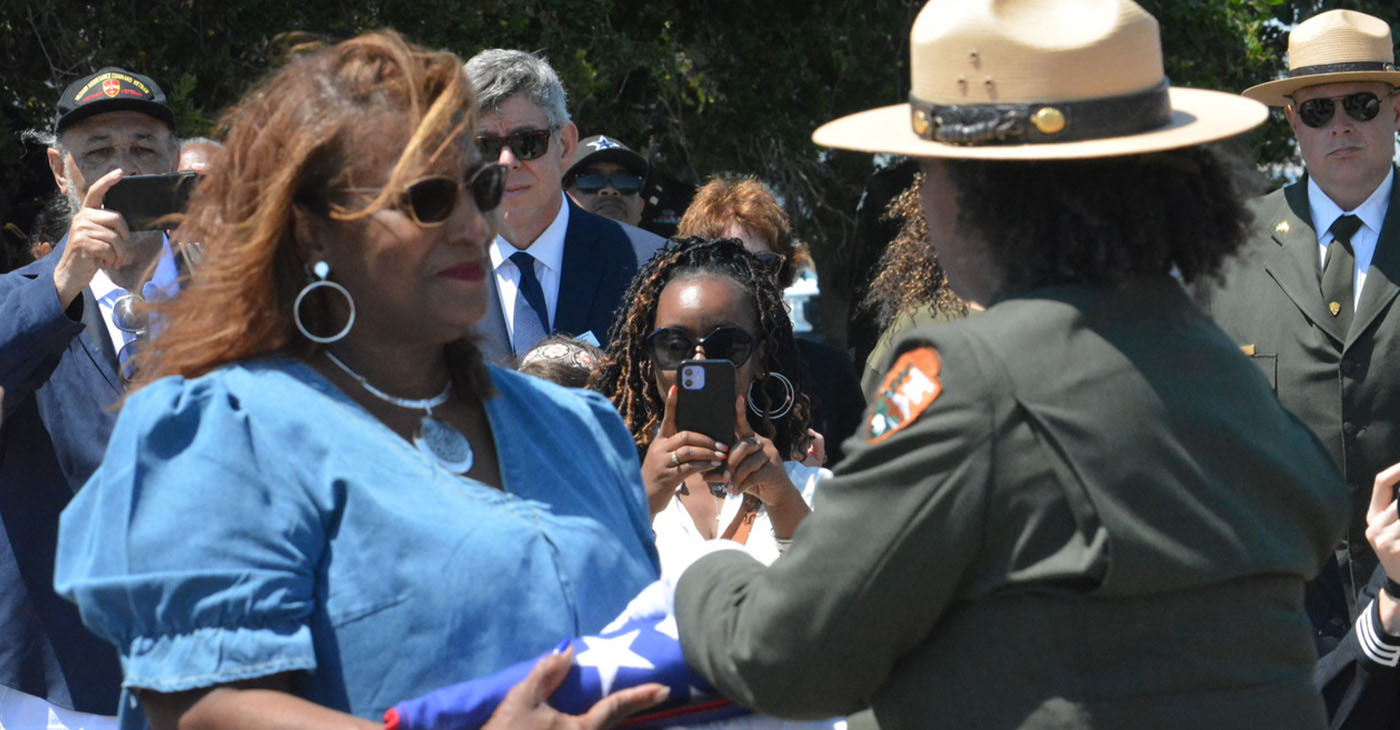Black History
Port Chicago: Navy Exonerates 256 Black Sailors Accused of 1944 Revolt
Three days after U.S. Secretary of the Navy Carlos Del Toro posthumously exonerated the remaining 256 African American Port Chicago defendants who were court-martialed for mutiny in 1944, he visited the historical site to participate in the 80th-year commemoration of the worst homefront disaster in U.S. history. Del Toro said the occasion at the Port Chicago Naval Magazine Memorial on the Suisun Bay, 35 miles north of San Francisco in Contra Costa County, was two-fold. According to him, the 90-minute ceremony was organized to honor all who died in the blasts and officially announce absolving Black men who were unjustly court-martialed for refusing to load bombs on naval cargo ships during World War II due to safety concerns.

By Antonio Ray Harvey
California Black Media
Three days after U.S. Secretary of the Navy Carlos Del Toro posthumously exonerated the remaining 256 African American Port Chicago defendants who were court-martialed for mutiny in 1944, he visited the historical site to participate in the 80th-year commemoration of the worst homefront disaster in U.S. history.
Del Toro said the occasion at the Port Chicago Naval Magazine Memorial on the Suisun Bay, 35 miles north of San Francisco in Contra Costa County, was two-fold. According to him, the 90-minute ceremony was organized to honor all who died in the blasts and officially announce absolving Black men who were unjustly court-martialed for refusing to load bombs on naval cargo ships during World War II due to safety concerns.
“This event marks a turning point in our nation’s history, a moment when we confront the ghosts of the past and embrace the promise of more justice,” Del Toro said. “For eight decades, the story of Port Chicago has been a stark reminder of a grave injustice. We as a nation will never be able to express our full gratitude to all deceased and their families for their dedication, service, and sacrifice.”
On July 20, a diverse group of 500 people were shuttled from the Military Ocean Terminal Concord (MOTCO) to the Port Chicago Naval Magazine Memorial where two deadly explosions occurred on the night of July 17, 1944.
The ceremony was hosted in partnership with the National Park Service (NPS), Friends of Port Chicago National Memorial, and the U.S. Army’s 834th Transportation Battalion.
The event also marked the 30th year the site was established as a memorial.
Along with Del Toro, dignitaries and elected officials in attendance were U.S. Congressmen John Garamendi (D-CA-08) and Thurgood Marshall Jr., whose father, Supreme Court Justice Thurgood Marshall, sought justice for the Port Chicago 50, the Black men who were wrongfully convicted in the fall of 1944 of insubordination during World War II.
Kelli English, the NPS’s service-wide program manager for Cooperating Associations and Partnerships, said tears from colleagues were flowing the day they heard about the exoneration of the men. English is part of the NPS crew that conducts tours of the National Memorial and shares the history of the tragedy.
“They never should have been court-martialed in some cases and convicted of other cases, but it does provide some closures for the families and descendants of those men,” English told California Black Media. “It’s so important to us. It’s the only amount of justice delivered years after the fact.”
The blasts resulted in the death of 320 sailors, 202 of them Black American sailors who were loading nearly 5,000 tons of munitions from a train into the naval cargo ships. About 400 more people were injured and the cargo train and both ships – SS Quinault Victory and SS EA Bryan – were destroyed.
Activism
Oakland Post: Week of November 26 – December 2, 2025
The printed Weekly Edition of the Oakland Post: Week of November 26 – December 2, 2025

To enlarge your view of this issue, use the slider, magnifying glass icon or full page icon in the lower right corner of the browser window.
Activism
Oakland Post: Week of November 19 – 25, 2025
The printed Weekly Edition of the Oakland Post: Week of November 19 – 25, 2025

To enlarge your view of this issue, use the slider, magnifying glass icon or full page icon in the lower right corner of the browser window.
Activism
IN MEMORIAM: William ‘Bill’ Patterson, 94
Bill devoted his life to public service and education. In 1971, he became the founding director for the Peralta Community College Foundation, he also became an administrator for Oakland Parks and Recreation overseeing 23 recreation centers, the Oakland Zoo, Children’s Fairyland, Lake Merritt, and the Henry J. Kaiser Convention Center.

William “Bill” Patterson, 94, of Little Rock, Arkansas, passed away peacefully on October 21, 2025, at his home in Oakland, CA. He was born on May 19, 1931, to Marie Childress Patterson and William Benjamin Patterson in Little Rock, Arkansas. He graduated from Dunbar High School and traveled to Oakland, California, in 1948. William Patterson graduated from San Francisco State University, earning both graduate and undergraduate degrees. He married Euradell “Dell” Patterson in 1961. Bill lovingly took care of his wife, Dell, until she died in 2020.
Bill devoted his life to public service and education. In 1971, he became the founding director for the Peralta Community College Foundation, he also became an administrator for Oakland Parks and Recreation overseeing 23 recreation centers, the Oakland Zoo, Children’s Fairyland, Lake Merritt, and the Henry J. Kaiser Convention Center.
He served on the boards of Oakland’s Urban Strategies Council, the Oakland Public Ethics Commission, and the Oakland Workforce Development Board.
He was a three-term president of the Oakland branch of the NAACP.
Bill was initiated in the Gamma Alpha chapter of Kappa Alpha Psi Fraternity.
In 1997 Bill was appointed to the East Bay Utility District Board of Directors. William Patterson was the first African American Board President and served the board for 27 years.
Bill’s impact reached far beyond his various important and impactful positions.
Bill mentored politicians, athletes and young people. Among those he mentored and advised are legends Joe Morgan, Bill Russell, Frank Robinson, Curt Flood, and Lionel Wilson to name a few.
He is survived by his son, William David Patterson, and one sister, Sarah Ann Strickland, and a host of other family members and friends.
A celebration of life service will take place at Henry J. Kaiser Convention Center (Calvin Simmons Theater) on November 21, 2025, at 10 AM.
His services are being livestreamed at: https://www.facebook.com/events/1250167107131991/
In lieu of flowers, donations can be made to the Euradell and William Patterson scholarship fund TBA.

-

 Activism3 weeks ago
Activism3 weeks agoOakland Post: Week of November 12 – 18, 2025
-

 Activism4 weeks ago
Activism4 weeks agoOakland Post: Week of November 5 – 11, 2025
-

 Activism2 weeks ago
Activism2 weeks agoIN MEMORIAM: William ‘Bill’ Patterson, 94
-

 Activism3 weeks ago
Activism3 weeks agoHow Charles R. Drew University Navigated More Than $20 Million in Fed Cuts – Still Prioritizing Students and Community Health
-

 #NNPA BlackPress3 weeks ago
#NNPA BlackPress3 weeks agoThe Perfumed Hand of Hypocrisy: Trump Hosted Former Terror Suspect While America Condemns a Muslim Mayor
-

 Bay Area3 weeks ago
Bay Area3 weeks agoNo Justice in the Justice System
-

 #NNPA BlackPress3 weeks ago
#NNPA BlackPress3 weeks agoProtecting Pedophiles: The GOP’s Warped Crusade Against Its Own Lies
-

 #NNPA BlackPress2 weeks ago
#NNPA BlackPress2 weeks agoTrump’s Death Threat Rhetoric Sends Nation into Crisis























































